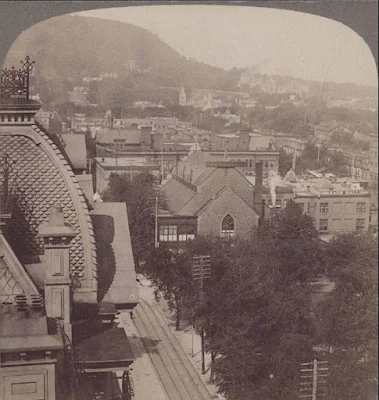 |
E.K. Brown, a study in conflict, Laura Smyth Groening,
University of Toronto Press (1993) |
A while ago I read Laura Smyth Groening's biography, E.K. Brown, a study in conflict (1993); Professor Smyth Groening taught at Concordia University, here in Montreal, like Patricia Morley who also taught at Concordia and wrote biographies of Leo Kennedy and William Kurelek. Smyth Groening's biography of E.K. Brown is fascinating; Brown was a Canadian scholar whose death in his early forties silenced an important voice of intelligence and dedication to literature. Brown was a gifted scholar who wrote on a variety of literary subjects: for instance, Canadian poetry before it became as fully recognized as it is today; he also wrote on Matthew Arnold, Willa Cather, and E.M. Forster and he translated French literature into English. During World War Two Brown worked as a speech writer for Prime Minister McKenzie-King. Brown had prodigious energy and curiosity. Brown was a man of prescience and foresight; he wrote on Cather and Forster when their reputations had fallen into decline. Brown also had a distinguished teaching career, he taught at Toronto, Winnipeg, Cornell, and Chicago and was recognized for his brilliance; it is unfortunate that Brown died in 1951 when he was only 45 years old. It seems that Brown's work is no longer discussed and Brown himself has been all but forgotten despite this excellent biography; I wonder how many graduate students in Canadian Literature have even heard of E.K. Brown...
There is much about Brown that I find interesting; for instance: he was one of the first scholars of his generation to favourably re-evaluate the Confederation Poets; he helped promote the literary careers of Duncan Campbell Scott (his friend) and Archibald Lampman (Scott's friend), and he emphasized the importance of Scott and Lampman over that of Carman and Roberts; in his yearly reviews of new Canadian books, published in the University of Toronto Quarterly, and in his book On Canadian Poetry (1943), he emphasized the importance of Canadian literature; he wrote on Mathew Arnold; he wrote the first biography of Willa Cather; he wrote on E.M. Forster. He was also friends with Leon Edel, both studied at the Sorbonne in the 1920s, and Edel completed Brown's biography of Cather after Brown's early death.
Perhaps it is Brown's friendship with Leon Edel that is his main connection to the Montreal Group of poets; Edel was not a member of the Montreal Group in the sense that he was a ;poet, but he was associated with them, he was a student at McGill University when the other members were active and he helped them publish the McGill Fortnightly Review; the Montreal Group included F.R. Scott, A.J.M. Smith, Leo Kennedy, and A.M. Klein. While Brown was good friends with Edel he was an acquaintance of A.J.M. Smith. In his review of a book of poems by Smith, Brown was disappointed that the book was so sleight. he contended, with others, that Smith, as a poet, had not published enough to be a significant poet. Personally, I don't agree with Brown on this, Smith has a few poems that are brilliant but, as readers, we do expect more than a hundred poems in a lifetime from a poet. Objectively, this is a correct conclusion; but upon reflection it is a different matter; time filters a poet's work, the good poems (possibly only two or three poems) survive and the rest of a poet's body of work becomes of little interest to most people other than a few critics and literature students. But later Brown almost apologizes to Smith for his earlier comments, he affirms that Smith was a good poet, just not a prolific poet. Both Brown and Smith published books on Canadian poetry in 1943; they were, in some ways, competitors in defining Canadian poetry.
Brown is not a poet but he is still an important part of our history of Canadian literature; he is not as important as Northrop Frye but he should not be far behind Frye in his significance to Canadian letters; however, neglect of Brown's books has resulted in most people never having heard of Brown.To get the full flavour of Brown's personality, I suggest reading his correspondence with Duncan Campbell Scott, it shows the warmth and kindness of the two men, it was an enduring friendship. I think it was Scott who mentions something about Northrop Frye in one of his letters, this was before Frye became famous, and there is speculation that Northrop Frye must be a made-up name, it is an amusing aside that echoes something of what other people have wondered over the years since then.
BTW, one day my friend George Johnston, who was a student of Frye's in the late 40s or early 1950s, said that he and some other poets, like Jay McPherson, who knew Frye, were called "Little Frye"; George was working on his PhD under Frye when Frye wanted him to read Madame Blavatsky's The Secret Doctrine : The Synthesis of Science, Religion, and Philosophy, a long and tedious work; it was at that moment he knew it was time to drop his PhD. I think Frye wanted him to read Blavatsky in relation to his studies on William Blake.
My only problem with Smyth Groening's biography is with the sub-title, I am not sure what the "study in conflict" is regarding E.K. Brown. He seems, to me, to have lived one of the least conflicted lives one could find. But maybe this is a reference to Matthew Arnold, I am not sure. Since reading Smyth Groening's biography of Brown I have read several of Brown's books, they all deserve to be read.


